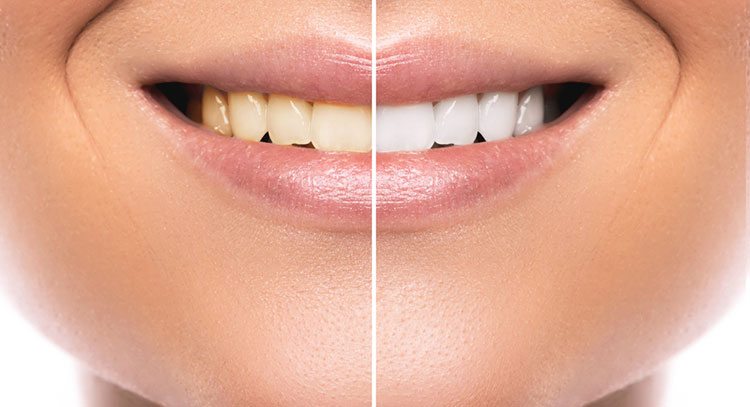
At Advanced Dentistry of Kearney, Dr. Reece can provide you with the brilliantly bright smile you’ve always wanted with teeth whitening and bleaching. Teeth whitening and bleaching are inexpensive and safe. Depending on your preference, you can choose to whiten or bleach just your upper teeth or both the top and bottom rows. You’ll be amazed at the difference just one teeth whitening or bleaching treatment can make in how confident you feel about the appearance of your smile.
While the American Dental Association (ADA) has defined the differences between teeth whitening and teeth bleaching, the terms are often used interchangeably. The ADA describes whitening as the process of restoring the natural color of teeth by removing stains from the tooth surface (removing extrinsic stains). Whereas, teeth bleaching refers to whitening teeth beyond their natural color, e.g., changing the intrinsic color of teeth. Both methods, however, are used for improving the color of teeth.
Tooth discoloration or yellowing is caused by a number of factors, including:
Both whitening and bleaching methods use a common ingredient, hydrogen peroxide, also known as H2O2. Hydrogen peroxide is a common household chemical often used to bleach hair and remove tough stains from clothes.
In whitening and bleaching teeth, hydrogen peroxide acts as an oxidizing agent that breaks down stains into smaller pieces, which makes the color less concentrated and your teeth brighter.
Hydrogen peroxide solutions are available in different potencies. Many over-the-counter (OTC) teeth whitening kits are available, which normally have 3 to 20 percent hydrogen peroxide or carbamide peroxide. OTC whitening methods include gels, chewing gums, rinses, toothpaste, paint-on films, and whitening strips. Natural remedies include the use of malic acid which is found in green apples.
In-office whitening and bleaching sessions are offered, where hydrogen peroxide of a higher concentration is used (15 to 43 percent hydrogen peroxide or carbamide peroxide).
During your consultation, Dr. Reece will review your medical and dental history with you (including allergies and sensitivities), examine your teeth, gums, and the placement and condition of restorations, if any. Sometimes x-rays may be taken to determine the nature and depth of possible irregularities.
If Dr. Reece determines that you are a viable candidate for teeth whitening or bleaching, you will be scheduled for a teeth whitening or bleaching appointment.
Teeth whitening and bleaching have become the most popular cosmetic dental procedures in the U.S. because teeth are among the most prominent features that people are likely to notice when meeting someone, For this reason, people try to keep their teeth in good shape and form to make a better impression. Studies show that the most common issue with the appearance of teeth is the impending yellowness with age.
Young adults are more conscious about their teeth and a vast majority do not feel confident enough to smile. According to the American Academy of Cosmetic Dentistry, survey results revealed that more than one-third of people are concerned by the look of their teeth, almost one in four people admit to hiding their teeth in photos, and over 70 percent of adults believe an unattractive smile will hurt their chances of obtaining a better career or success.
Techniques like bleaching and whitening give people a chance to reclaim their confidence. These methods either restore the original color of teeth (whitening) or brighten them beyond their original color (bleaching).
Don’t wait to get the healthier, better-looking smile you’ve always wanted. Call Advanced Dentistry of Kearney at (308) 237-1311 to schedule your teeth whitening or bleaching appointment with Dr. Reece today!
OTC whitening kits that bear the ADA’s Seal of Acceptance indicate that they are both safe and effective for whitening when used as directed. While they do produce some results, they are not as long-lasting and they take significantly longer than do at-home or in-office approaches.
Dentists offer both at-home and in-office options for teeth whitening and bleaching. Both options are dentist-supervised--whitening products supplied by dentists for use at home or applied by dentists in the office. In-office whitening and bleaching procedures are generally faster and more effective than at-home ones since the bleaching agent used (hydrogen peroxide or carbamide peroxide) has greater concentration levels.
Teeth whitening and bleaching may be right for you if you have:
Note that whitening and bleaching do not work well on all teeth, especially those that have brown or gray stains. For these patients, veneers or crowns may be a better option.
Teeth whitening and bleaching is not for everyone, especially if you
Some patients experience side effects after teeth whitening and bleaching treatments. The biggest risks are tooth sensitivity and gum irritation. These effects are usually temporary, not lasting more than 1 or 2 days after treatment. Using toothpaste for sensitive teeth will help to take away some of the “tingling” feelings in your teeth.
In-office (chairside) teeth whitening usually keeps your smile white for about a year. Teeth whitening with take-home products from your dentist usually lasts for several months. Most people find they need a touch-up every 4 to 6 months.